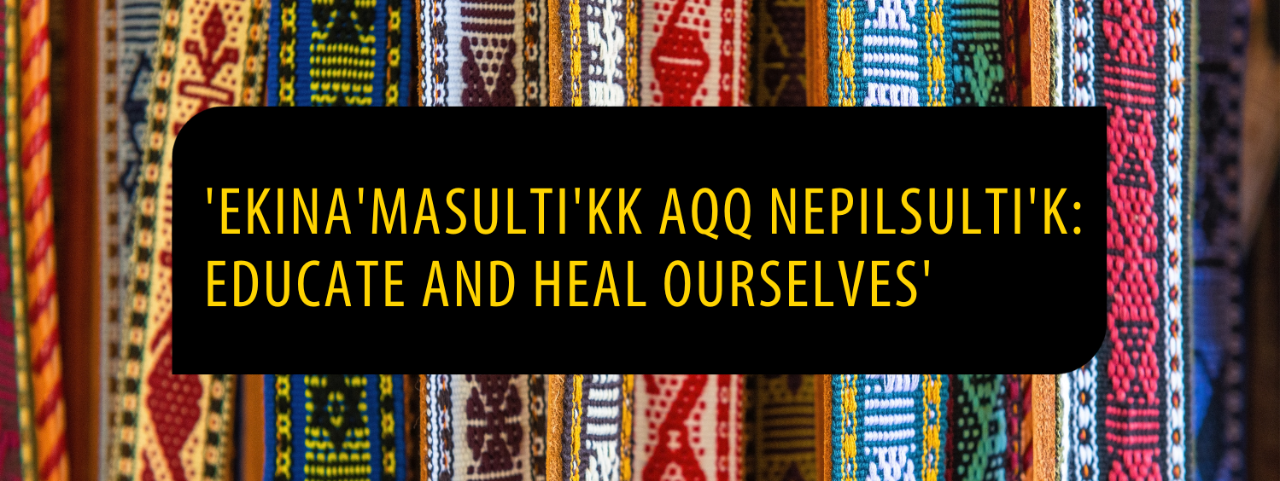| |
May 3
|
8:40 -
9:40am |
Plenary: Etuaptmu'k Wloti - Together, We Address Our Health
Dr. John Sylliboy, Executive Director, Wabanaki Two Spirit Alliance; Inaugural Vice-Provost, Indigenous Relations Dalhousie
At the end of the session, the participant will be able to:
- Explain the foundations of Etuaptmumk for health
- Develop awareness about the importance of integrating L'nuwey knowledge into healthcare
- Discuss the importance of developing pathways to transform healthcare based on 'We Are All Treaty People'
Lecture and Q&A (15 minutes)
|
9:50 -
10:50am |
Mi'kmaw Self-Determination in Health and Wellnes
Julie Francis, Director, L’nu Nursing
At the end of the session, the participant will be able to:
- Explain the concept and importance of Mi'kmaw self determination in Health and Wellness
- Recognize the importance of self determination in Health Education & Professionals training, and its benefits
- Practice in a way that enhances Mi'kmaq Self determination in health and wellness
- Advocate to promote and protect Mi'kmaw & Indigenous Self Determination in health and wellness
Lecture and Q&A (15 minutes)
|
11:00 -
12:00pm |
Incorporating Mi'kmaw Tradition and Culture into Primary Care
Paulina Meader, LPN, Health Director for Wije’winen Health Center
At the end of the session, the participant will be able to:
- Review Mi’kmaw Ways of Being and Knowing/Indigenous World Views
- Recognize Mi’kmaw perspectives on health/healing and two-eyed seeing healthcare approaches
- Describe what culturally humble care looks like in practice
- Explain how to be an effective ally
Lecture and Q&A (15 minutes)
|
1:00 -
4:00pm |
Blanket Ceremony
Elder Ann LaBillois Elder in Residence, Dalhousie University
At the end of the session, the participant will be able to:
- Illustrate shared understanding of the histories of Indigenous and non-indigenous people in Canada
Active participation – please wear comfortable clothing, there will be no breaks.
|
| |
May 4
|
8:30 -
9:30am |
Beyond Nutrition: Indigenous Food Sovereignty as Public Health
Chelsea Purdy, Dietician, Department of Health, Union of Nova Scotia Mi’kmaq
At the end of the session, the participant will be able to:
- Differentiate key characteristics of Western and Indigenous Knowledge Systems, highlighting their philosophical foundations and approaches to knowledge generation and education
- Examine the relationship between food, land, and Indigenous Knowledge Systems, emphasizing their role in supporting community health and empowerment
- Evaluate Indigenous-informed public health and community development strategies that center food as a pathway to promoting community trust, education, and healing
Lecture and Q&A (15 minutes)
|
9:40 -
11:10am |
Workshop - Addressing overt discriminations and microagressions
Dr. Brent Young, Academic Director of Indigenous Health, Dalhousie
Dr. Tiffany O’Donell, Indigenous Health Lead, Dalhousie Family Medicine
At the end of the session, the participant will be able to:
- Prepare a safe learning environment
- Formulate a strategy to address microaggressions in the moment
Brief lecture (30 min) followed by case-based, small group simulation (60 min)
|
11:10 -
11:45am |
Guided Reflection
Elder Ann LaBillois, Elder in Residence, Dalhousie University
At the end of the session, the participant will be able to:
- Demonstrate self-reflection skills that include an analysis of one’s own response to the histories and contemporary Indigenous approaches to health.
- Demonstrate a commitment to patients and their families, colleagues, learners, and to society through ethical and reflective practice
|

